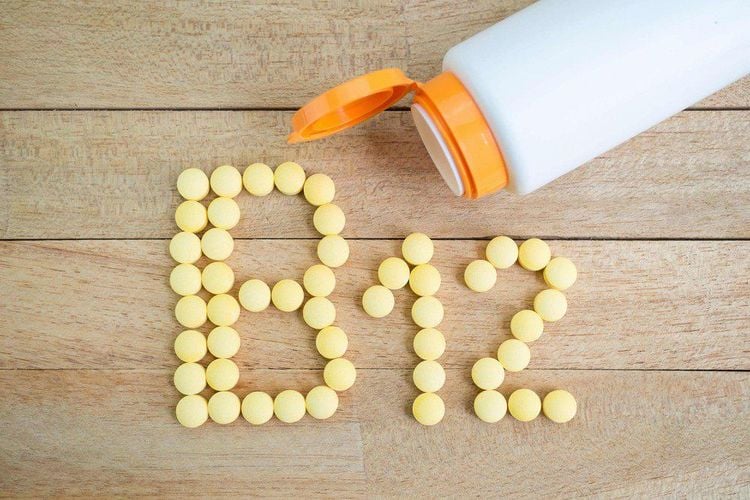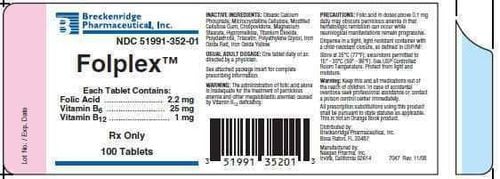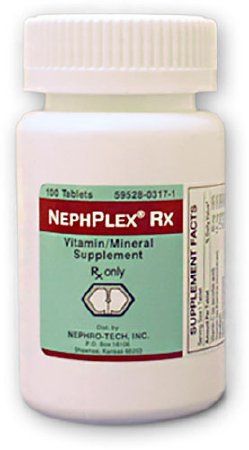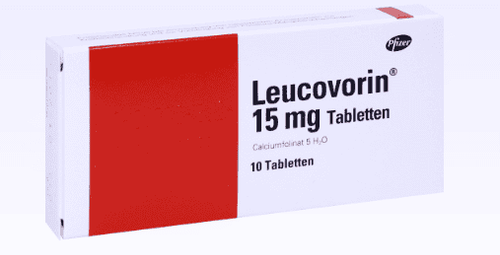This is an automatically translated article.
For those who are vegetarian for a long time or have digestive problems, they will be prone to vitamin B12 deficiency. A lack of vitamin B12 can lead to anemia, fatigue, muscle weakness, intestinal problems, and nerve damage and psychological disturbances.1. What is Vitamin B12?
Vitamin B12 (cobalamin) is a water-soluble vitamin that plays an essential role in red blood cell formation, cell metabolism, nerve function, and DNA production. And the body has the ability to store vitamin B12 for several years, so cases of vitamin B12 deficiency are very rare.2. Food sources of vitamin B12
Food sources rich in vitamin B12 include poultry, fish and dairy products. Vitamin B12 is also added to some foods and is available as an oral supplement.
Vitamin B12 injection or nasal spray may be indicated to treat vitamin B12 deficiency. The recommended daily amount of vitamin B12 for adults is 2.4 micrograms.
3. Symptoms of vitamin B12 deficiency
If you have a vitamin B12 deficiency, you can develop anemia, if mild deficiency may cause no symptoms, but if left untreated, anemia can lead to symptoms such as:
Weakness, fatigue , lightheadedness Fast heartbeat and trouble breathing Pale skin Pale tongue Constipation , diarrhea, loss of appetite or bloating Nervous problems such as numbness or tingling, muscle weakness and problems walking Vision loss Mental health problems such as depression, memory loss, or behavior changes.

Thiếu vitamin B12 làm da nhợt nhạt
4. Vitamin B12 deficiency causes what diseases?
With age, it becomes more and more difficult to absorb vitamin B12. A vitamin B12 deficiency can also occur if you've had surgery to lose weight or other surgery to remove part of your stomach or drink a lot of alcohol.
You may also be more susceptible to vitamin B12 deficiency if:
Atrophic gastritis, in which the stomach lining thins, Pernicious anemia makes it difficult for the body to absorb vitamin B12 Diseases that affect the small intestine such as Crohn's disease , celiac disease, harmful bacteria growth, or parasites Immune system disorders, such as Graves disease or lupus Are taking certain medications that interfere with vitamin B12 absorption including some for heartburn heat includes proton pump inhibitors (PPIs) such as rabeprazole, omeprazole, esomeprazole, lansoprazole, and pantoprazole; H2 blockers such as cimetidine, famotidine, and ranitidine; and some diabetes medications such as metformin. Someone who is on a vegan diet (meaning you don't eat any animal products, including meat, dairy, cheese, and eggs) or you're on a diet but don't eat enough eggs or dairy products milk to meet the body's need for vitamin B12. In either case, you can add foods enriched with vitamin B12 to your diet or take a supplement to meet this need.
5. Recommended dosage of vitamin B12
Depending on age, eating habits, health conditions and medications you are taking, the amount of vitamin B12 needed will vary. The amounts of vitamin B12 below are the average amounts recommended by the US Centers for Disease Control and Prevention (U.S. CDC):
Infants through 6 months of age: 0.4 mcg Children 7-12 months of age: 0 ,5 mcg Children 1-3 years old: 0.9 mcg Children 4-8 years old: 1.2 mcg Children 9-13 years old: 1.8 mcg Teenagers 14-18 years old: 2, 4 mcg (2.6 mcg daily if pregnant and 2.8 mcg daily if breastfeeding) Adults: 2.4 mcg (2.6 mcg daily if pregnant and 2.8 mcg daily if given) breastfeeding).
6. What is the treatment of vitamin B12 deficiency?
If you have pernicious anemia or have difficulty absorbing vitamin B12, you will initially need injections of this vitamin. Then continue with the next injection and switch to a high-dose oral supplement.
If you don't eat animal products, you have options like supplementing your diet with vitamin B12 fortified cereals, taking supplements, injecting or taking high doses of vitamin B12 if you have short.
Older adults with vitamin B12 deficiency may need a daily vitamin B12 supplement or a multivitamin containing B12.
In most cases, with adequate vitamin B12 supplementation, the symptoms will resolve to some extent, but nerve damage from vitamin B12 deficiency can leave permanent sequelae.

Bổ sung vitamin B12 hàng ngày đóng vai trò thiết yếu trong việc hình thành tế bào hồng cầu,
7. Side effects of vitamin B12
When used in appropriate doses, vitamin B12 supplements are very safe for the body. While the recommended daily amount of vitamin B12 for adults is 2.4 micrograms, you can take a slightly higher dose because the body only absorbs the right amount and the excess is excreted through the water. urine.
However, in the case of high doses of Vitamin B12, such as those used to treat deficiencies, side effects such as:
Dizziness Headache Fatigue Nausea Vomiting Interactions medicine
When the patient takes the last drugs vitamin B12 can reduce the body's absorption of Vitamins such as:
Aminosalicylic acid to treat digestive problems. Colchicine (Colcrys, Mitigare) to prevent and treat gout attacks. Metformin (Glumetza, Glucophage, Fortamet) treats diabetes. Proton pump inhibitors such as omeprazole (Prilosec), lansoprazole (Prevacid), or other medicines that reduce stomach acid. Taking vitamin B12 with vitamin C might decrease the amount of vitamin B12 available in your body. To avoid this interaction, take vitamin B12 first, and then take vitamin C for 2 hours or more.
Please dial HOTLINE for more information or register for an appointment HERE. Download MyVinmec app to make appointments faster and to manage your bookings easily.
References: Mayoclinic.org, Webmd.com, Healthline.com












